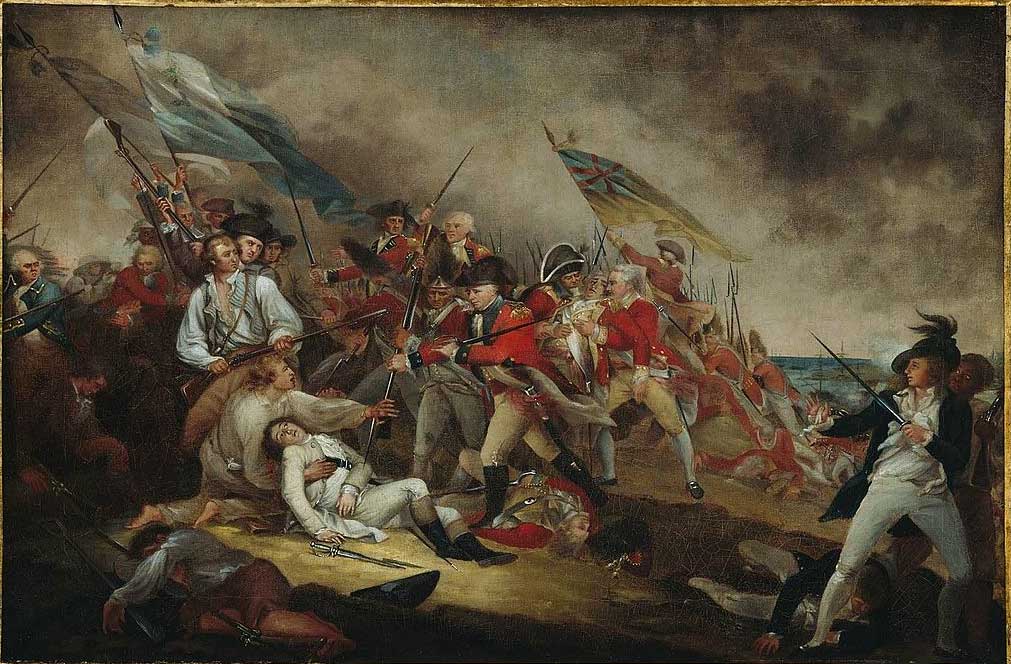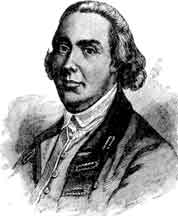Bunker Hill 1775

The Americans occupied Bunker Hill overlooking Boston on the evening of June 16th. The British, commanded by General Gage, had no choice but to attack the Americans. On the afternoon of the 17th, Gage's forces attacked. In a hard fought battle, the American were forced to withdraw. While the British were victorious, they suffered heavy losses. The battle shocked the British who were expecting an easy victory.
.
After the battles of Lexington and Concord, the Army of New England, and the British Army faced one another in Boston. The New England Militia had surrounded Boston, while the British army occupied the city. Neither the New England Militia, nor the British forces occupied Dorchester Heights or Bunker Hill, both of which had clear strategic importance. General Gage ordered the occupation of the Heights beginning June 16th. Word of Gage's plans reached the Colonists. The Colonists decided to act first. On the evening of June 16th, Colonel William Prescott acted on orders of General Artemas Ward. Prescott led two Massachusetts regiments, his own artillery company, plus a large work detail out of Cambridge to occupy Bunker Hill.
Colonel Prescott was an experienced soldier, having fought in two British wars. Despite being 49 years old, Prescott was in good shape. Prescott arrived in Charelston Neck with nearly 1,200 soldiers. He met up with Colonel Putman, whose additional 250 Connecticut volunteers joined them.
Once in Charleston Neck, the Americans decided to dig in and fortify Breed Hill. American troops worked through the night to fortify their position. With first light, British ships at anchor in the harbor noticed the American forces on the hills and began firing. General Gage ordered an attack on the American forces.

The 23rd Regiment, known as "the Royal Welch Fusiliers", headed for the redoubt. The Americans, who had limited gunpowder, held their fire until they were within fifty feet of the British. When in range, the Americans opened fire on the thick column of British soldiers before them. A British officer described the scene: "Our Light Infantry were served up in companies, and were devoured by musket fire." The British attack broke. Meanwhile, the attack above, on the railed fence by the Grenadiers ran into similar trouble. Once again the Americans held their fire until the British were close by. Two attacks of the Grenadiers were successfully turned back. However, the Americans were soon running out of ammunition. On the third attack the British succeeded in overrunning the redoubt. Most of the Americans succeeded in withdrawing. Thirty Americans were caught in the redoubt and killed by the British.
In the end, the Americans were forced to withdraw. Bunker Hill was in British hands. 226 British soldiers died taking the hill and 828 were wounded. 140 American soldiers were killed and an additional 271 wounded. The British lost a total of 1,500 men; In the two engagements that had taken place first on the road to Concord and Lexington, and now here at Bunker Hill. British loses represented one quarter of the soldiers that the British army had stationed in Boston.
One or two more "victories" like Bunker Hill and the British would lose the war. On top of that, until Bunker Hill, the British army was under the illusion that the Americans were no match for British regulars. The British thought the Americans would surely break and run in combat. Instead, the Americans proved to be steady, secure, and brave. The Americans withdrew only after they were out of ammunition. In retrospect, after Bunker Hill it should have been clear to the British that they would not be able defeat the Americans. Unfortunately, they would spend the next seven years trying to do so.
| Eyewitness Account | General Howe's Report | William Prescott's Account |
 >
>